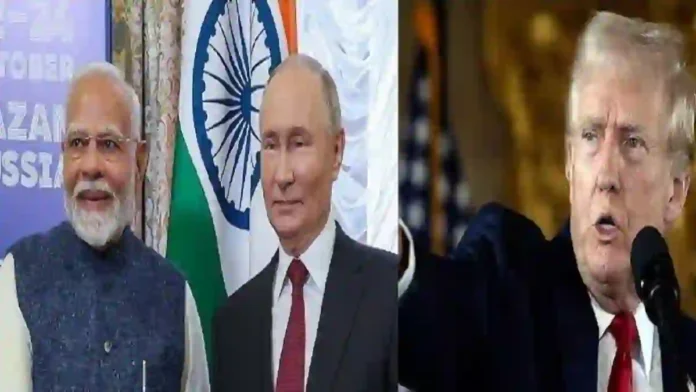US President Donald Trump is aggressively pressuring European nations to adopt U.S.-style sanctions against India over its continued import of Russian oil, escalating a major geopolitical dispute that risks a global economic ripple effect. The United States recently doubled tariffs on Indian goods to 50%, invoking arguments that India is directly funding Russia’s war in Ukraine through its energy purchases.
Despite these measures, the Trump administration remains unsatisfied, demanding that Europe halt all oil and gas trade with India and actively consider secondary tariffs if European countries do not comply with Washington’s stance. The White House’s frustration with Europe’s reluctance to enforce similar punitive actions is apparent, as some European leaders privately resist the pressure, highlighting splits in Western coordination.
Read- VTOL Aviation Develops ABHINANDAN HNX50D Series of Hybrid Fixed Wing VTOL UAVs
Tariff Fallout And Backfire
India, whose exports to the US top $87 billion annually, faces significant economic damage from the steep tariffs, which threaten more than $48 billion in goods and thousands of export-based jobs. While intended to curb India’s Russian oil purchases, the tariffs have largely backfired: Russia has responded by lowering oil prices further for India, deepening bilateral trade ties and motivating India to resume and expand purchases after only a brief pause.
China, meanwhile, has increased its own Russian oil shipments, underscoring the selective and arguably flawed enforcement of U.S. sanctions and tariffs. For Indian refiners, the price difference between Russian and Middle Eastern crude has become even more attractive, undermining Washington’s intent.
India’s Pushback And Accusations of Hypocrisy
Indian officials have condemned the measures as “unfair, unjustified, and unreasonable,” highlighting the West’s double standards: China remains the largest buyer of Russian oil and European nations themselves have imported substantial amounts of Russian energy since the Ukraine conflict began, yet neither has faced tariffs or sanctions of the scale India is experiencing. India accuses the US and Europe of hypocrisy and economic pressure tactics that disregard global energy realities, and refuses to be singled out as an enabler of Moscow’s war efforts.
Geopolitical Repositioning And The SCO Summit
The timing of these actions coincides with the Shanghai Cooperation Organisation (SCO) summit in Tianjin, where Prime Minister Narendra Modi, Chinese President Xi Jinping, and Russian President Vladimir Putin are staging talks that reflect evolving alliances in Eurasia. Modi, resolute at the summit, emphasises India’s “special and privileged” relations with Moscow and calls for constructive solutions to the Ukraine conflict, not unilateral economic punishments.
The summit is particularly notable as India and China move to normalise strained ties, signalling a broader strategic shift that unsettles Washington and highlights India’s intention to assert its sovereignty and keep multiple major powers as potential partners—not as permanent allies.
Europe’s Dilemma And Indian Strategy
Europe remains caught between Washington’s demands and its own economic interests. EU governments have balked at the prospect of matching U.S. tariffs, wary of economic self-harm and reluctant to antagonize India. Indian officials maintain that energy deals are determined by market realities, while some U.S. policymakers claim India may eventually reduce Russian oil imports under sustained pressure.
Geopolitical analysts argue that India is employing a shrewd, pragmatic negotiating posture—standing firm against U.S. tariffs, building alternate partnerships, and illustrating to Western allies the necessity for dialogue and genuine cooperation, rather than top-down coercion.
Conclusion
The escalating dispute over Russian oil imports has become a flashpoint in world politics, exposing inconsistencies within Western policy and driving India to recalibrate global relationships. The SCO summit and resultant diplomatic manoeuvring signal India’s determination to resist Western economic pressure and maintain independent energy policy, while the West faces increasing difficulty sustaining a united front both internally and in the wider “Global South”.
Based On TOI Report
Agency




